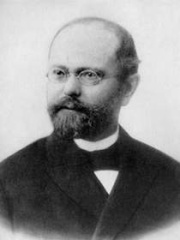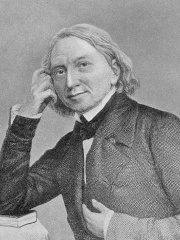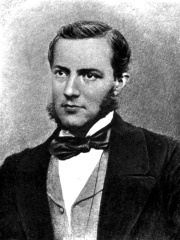
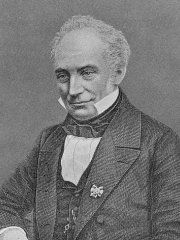

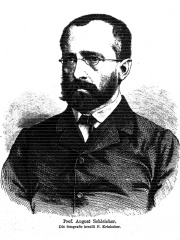
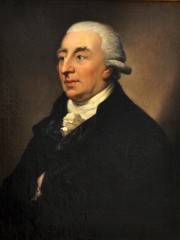
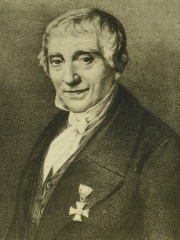
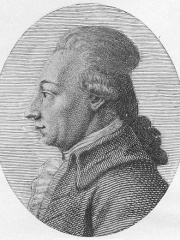
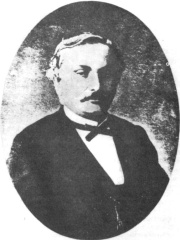
The Most Famous
LINGUISTS from Germany
Top 10
The following people are considered by Pantheon to be the top 10 most legendary German Linguists of all time. This list of famous German Linguists is sorted by HPI (Historical Popularity Index), a metric that aggregates information on a biography's online popularity. Visit the rankings page to view the entire list of German Linguists.

1. Max Müller (1823 - 1900)
With an HPI of 79.01, Max Müller is the most famous German Linguist. His biography has been translated into 50 different languages on wikipedia.
Friedrich Max Müller (German: [ˈfʁiːdʁɪç ˈmaks ˈmʏlɐ]; 6 December 1823 – 28 October 1900) was a German-born British comparative philologist and Orientalist. He was one of the founders of the Western academic disciplines of Indology and religious studies. Müller wrote both scholarly and popular works on the subject of Indology. He directed the preparation of the Sacred Books of the East, a 50-volume set of English translations which continued after his death. Müller became a professor at Oxford University, first of modern languages, then of comparative philology in a position founded for him, and which he held for the rest of his life. Early in his career he held strong views on India, believing that it needed to be transformed by Christianity. Later, his view became more nuanced, championing ancient Sanskrit literature and India more generally. He became involved in several controversies during his career: he was accused of being anti-Christian; he disagreed with Darwinian evolution, favouring theistic evolution; he raised interest in Aryan culture, deeply disliking the resulting racist Aryanism; and he promoted the idea of a "Turanian" family of languages. Among his honours and distinctions, he was made an associé étranger of the French Académie des Inscriptions et Belles-Lettres; he was awarded the Bavarian Maximilian Order for Science and Art; and he was made a member of the Privy Council of the United Kingdom.

2. Franz Bopp (1791 - 1867)
With an HPI of 73.31, Franz Bopp is the 2nd most famous German Linguist. His biography has been translated into 52 different languages.
Franz Bopp (German: [ˈfʁants ˈbɔp]; 14 September 1791 – 23 October 1867) was a German linguist known for extensive and pioneering comparative work on Indo-European languages.

3. Jost Gippert (b. 1956)
With an HPI of 72.21, Jost Gippert is the 3rd most famous German Linguist. His biography has been translated into 67 different languages.
Jost Gippert (German pronunciation: [ˈjoːst ˈgɪpʰɐt]; born 12 March 1956 in Winz-Niederwenigern, later merged to Hattingen) is a German linguist, Caucasiologist, author, and the Senior Professor at the Centre for the Study of Manuscript Cultures at the University of Hamburg.

4. August Schleicher (1821 - 1868)
With an HPI of 71.80, August Schleicher is the 4th most famous German Linguist. His biography has been translated into 43 different languages.
August Schleicher (German: [ˈaʊɡʊst ˈʃlaɪçɐ]; 19 February 1821 – 6 December 1868) was a German linguist. Schleicher studied the Proto-Indo-European language and devised theories concerning historical linguistics. His great work was A Compendium of the Comparative Grammar of the Indo-European Languages in which he attempted to reconstruct the Proto-Indo-European language. To show how Indo-European might have looked, he created a short tale, Schleicher's fable, to exemplify the reconstructed vocabulary and aspects of Indo-European society inferred from it.
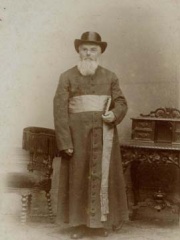
5. Johann Martin Schleyer (1831 - 1912)
With an HPI of 69.72, Johann Martin Schleyer is the 5th most famous German Linguist. His biography has been translated into 45 different languages.
Johann Martin Schleyer (German pronunciation: [ˈjoːhan ˈmaʁtiːn ˈʃlaɪɐ]; 18 July 1831 – 16 August 1912) was a German Catholic priest who invented the constructed language Volapük. His official name was "Martin Schleyer"; he added the name "Johann" (in honor of his godfather) unofficially.

6. Johann Christoph Adelung (1732 - 1806)
With an HPI of 68.86, Johann Christoph Adelung is the 6th most famous German Linguist. His biography has been translated into 38 different languages.
Johann Christoph Adelung (8 August 1732 – 10 September 1806) was a German grammarian and philologist.

7. Georg Friedrich Grotefend (1775 - 1853)
With an HPI of 67.37, Georg Friedrich Grotefend is the 7th most famous German Linguist. His biography has been translated into 30 different languages.
Georg Friedrich Grotefend (9 June 1775 – 15 December 1853) was a German epigraphist and philologist. He is known mostly for his contributions toward the decipherment of cuneiform. Georg Friedrich Grotefend had a son, named Carl Ludwig Grotefend, who played a key role in the decipherment of the Indian Kharoshthi script on the coinage of the Indo-Greek kings, around the same time as James Prinsep, publishing Die unbekannte Schrift der Baktrischen Münzen ("The unknown script of the Bactrian coins") in 1836.

8. Friedrich August Wolf (1759 - 1824)
With an HPI of 66.35, Friedrich August Wolf is the 8th most famous German Linguist. His biography has been translated into 27 different languages.
Friedrich August Wolf (; German: [vɔlf]; 15 February 1759 – 8 August 1824) was a German classicist who is considered the founder of classical and modern philology.

9. Michel Bréal (1832 - 1915)
With an HPI of 66.28, Michel Bréal is the 9th most famous German Linguist. His biography has been translated into 33 different languages.
Michel Jules Alfred Bréal (French: [miʃɛl bʁeal]; 26 March 1832 – 25 November 1915), French philologist, was born at Landau in Rhenish Palatinate. He is often identified as a founder of modern semantics. He was also the creator of the modern marathon race, having proposed its first running at the 1896 Olympic Games and offered what would become known as Breal's Silver Cup to the winner.
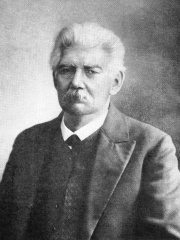
10. Vasily Radlov (1837 - 1918)
With an HPI of 66.24, Vasily Radlov is the 10th most famous German Linguist. His biography has been translated into 31 different languages.
Vasily Vasilievich Radlov (Russian: Васи́лий Васи́льевич Ра́длов), born Friedrich Wilhelm Radloff (17 January [O.S. 5 January] 1837 – 12 May 1918) was a German and Russian linguist, ethnographer, and archaeologist, often considered to be the founder of Turkology, the scientific study of Turkic peoples. He was the first to publish the Orhon inscriptions (though he did not succeed in deciphering them).
People
Pantheon has 33 people classified as German linguists born between 1732 and 1956. Of these 33, 2 (6.06%) of them are still alive today. The most famous living German linguists include Jost Gippert, and Christiane Nord. The most famous deceased German linguists include Max Müller, Franz Bopp, and August Schleicher.
Living German Linguists
Go to all RankingsDeceased German Linguists
Go to all RankingsMax Müller
1823 - 1900
HPI: 79.01
Franz Bopp
1791 - 1867
HPI: 73.31
August Schleicher
1821 - 1868
HPI: 71.80
Johann Martin Schleyer
1831 - 1912
HPI: 69.72
Johann Christoph Adelung
1732 - 1806
HPI: 68.86
Georg Friedrich Grotefend
1775 - 1853
HPI: 67.37
Friedrich August Wolf
1759 - 1824
HPI: 66.35
Michel Bréal
1832 - 1915
HPI: 66.28
Vasily Radlov
1837 - 1918
HPI: 66.24
Hermann Paul
1846 - 1921
HPI: 64.69
Hugo Schuchardt
1842 - 1927
HPI: 64.18
Karl Lachmann
1793 - 1851
HPI: 63.61
Overlapping Lives
Which Linguists were alive at the same time? This visualization shows the lifespans of the 25 most globally memorable Linguists since 1700.


